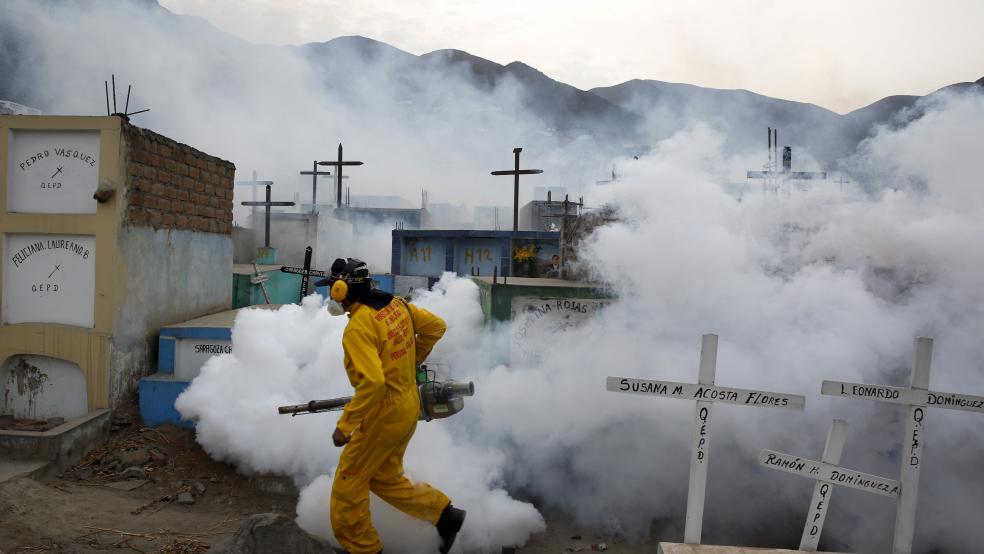The World Health Organization on Monday declared the outbreak of the Zika virus a global public health emergency.
Before last year, the virus, carried by mosquitoes, was largely restricted to Africa and Asia, but last May an outbreak occurred in Brazil, where Zika has been linked to birth defects in thousands of children. The virus is “spreading explosively” across the Americas and could infect nearly 4 million people across the continents, according to Margaret Chan, the director general of the WHO. Chan says that the Zika virus has escalated from a mild threat to a dire one.
Related: The Top 9 Summer Insects to Avoid and How
The virus appears to be spreading so rapidly for a few reasons. First, it’s now in regions that haven’t been exposed to it before, where people have not had a chance to develop immunity. Second, it’s primarily transmitted through a mosquito species that lives in every country in North and South America except Canada and Chile. Third, there is no vaccine against it, no medication to cure it and no quick diagnostic test to confirm a Zika infection.
Here are some answers to questions that many are asking regarding the virus:
What exactly is the Zika virus?
Zika is a flavivirus, which puts it in the same family as yellow fever, chikungunya, West Nile and dengue. It’s spread to humans through mosquitoes, primarily the Aedes aegypti species. The virus has also been known to be transmitted through sexual contact and blood transfusion. Infected people typically don’t develop any symptoms, but those who do show signs of illness most commonly develop a slight fever, skin rash, joint pain and red eyes. These symptoms are typically mild and last between two and seven days.
Why is Zika such a big concern?
Only one-fifth of people with the disease actually know that they’ve been infected because it usually doesn’t cause any symptoms — but that’s exactly the problem. The virus has a scary connection with microcephaly, a neurological condition in which babies have unusually small heads. If a woman is unaware she has the virus, she might choose to get pregnant and the disease could pass through her amniotic fluid to the unborn child. In about 15 percent of cases, a small head doesn’t have an effect on the infant. But in other cases, the infant’s brain might not have developed properly. These children could have a range of problems, including developmental delays, hearing loss or intellectual deficits.
Although it hasn’t been proven that the Zika virus causes microcephaly, evidence suggests the virus is to blame. Doctors in northern Brazil noticed an increase in babies with microcephaly in October, around the same time the Zika virus outbreak began. The country has more than 4,000 suspected cases of microcephaly.
Public health officials are also searching for a possible association between the virus and a syndrome known as Guillain-Barré that can lead to paralysis.
Is Zika in the United States?
The U.S. has 31 confirmed cases in 11 states and the District of Columbia, but all are from travelers that are returning from infected areas. There are also 20 additional cases in U.S. territories — 19 in Puerto Rico and one in the U.S. Virgin Islands. The main concern is that these imported cases could result in locally transmitted ones through mosquito bites. Aedes mosquitoes live in many areas of the U.S.
Related: This Bug Is Deadlier Than Humans – and a Costly Killer, Too
How can I protect myself?
It makes sense to take some basic precautions. The CDC has recommended that pregnant women avoid traveling to areas where Zika is being transmitted, and advises women that are thinking about getting pregnant to talk to their doctors before going to those regions. In addition, the CDC has also advised that men who have traveled to areas with the virus should consider using condoms and pregnant women should avoid contact with semen from men exposed to the virus.
If you are traveling to a country affected by the outbreak, the CDC advises that that you avoid or minimize contact with mosquitos by staying in screened or air-conditioned rooms or sleeping with a mosquito net, covering yourself with insect repellant at all times and wearing long pants, long sleeves, shoes and hats.
How do I know if I’ve been infected?
The disease is diagnosed by analyzing blood samples. But because of the virus’s close relationship with dengue, West Nile and yellow fever, diagnosis can be difficult.
If you are infected, there’s not much you can do, but rest, drink fluids to avoid becoming dehydrated and take medicine like acetaminophen to relieve fever and pain. The CDC does recommend that anyone with Zika try to avoid mosquito bites during the first week of infection. The Zika virus usually stays in the blood of infected people for just a few days.





